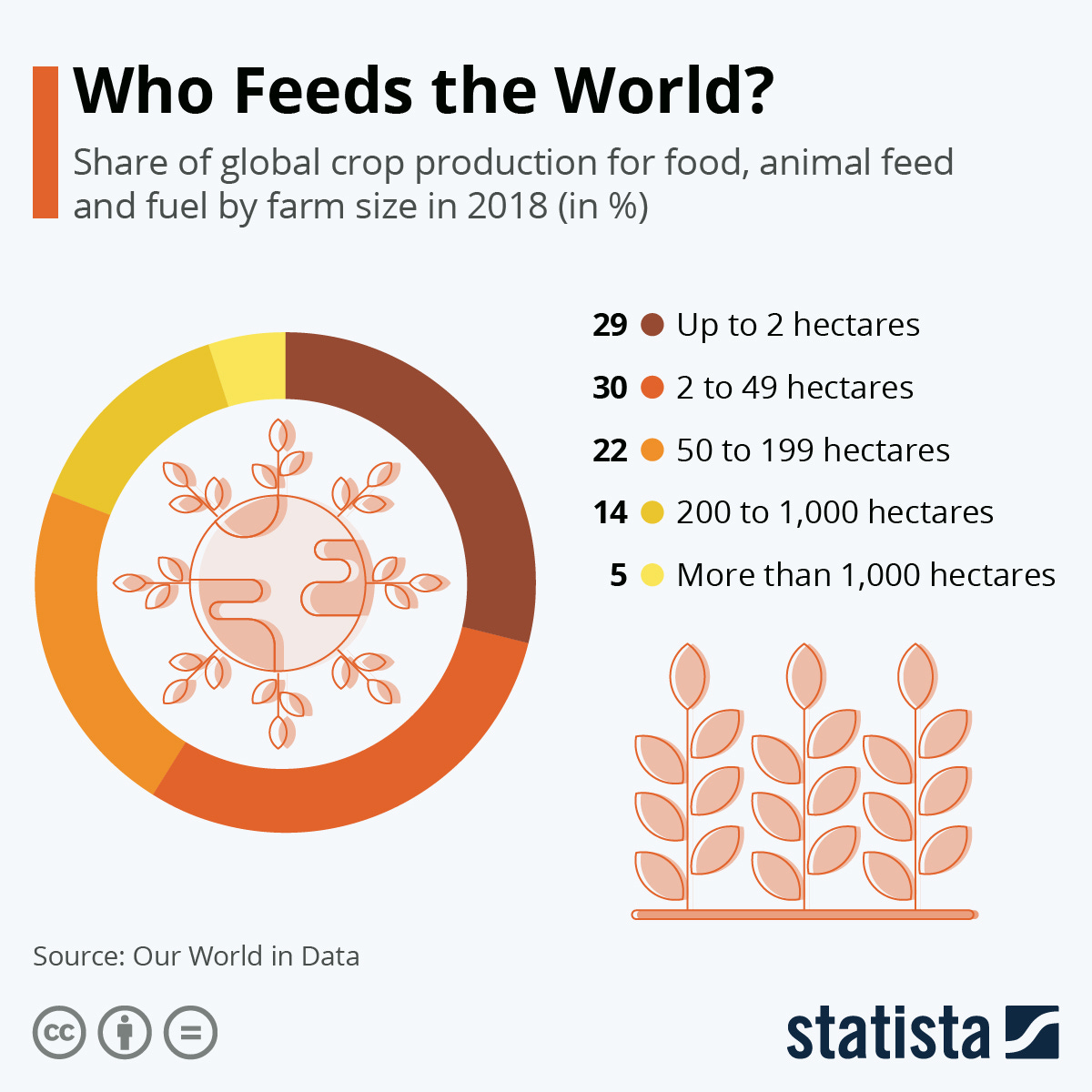There was once a bloke who wrote that he has a wife who grew a pumpkin, some tomatoes and a couple of chillies. The bloke went on to write an article explaining that because his family had produced so little on their allotment he was now convinced that large-scale agriculture is the only way to feed the population of his country, England. He also managed to squeeze in a reference to one of his books so maybe he'll get some more sales. The article was published in a national newspaper and can be read online.There are other less pretty names for large-scale agriculture but let's continue using the term.
Pretty easy journalism really, take an extreme case, one allotment, one pumpkin and a few tomatoes and deduce from that production that mainstream agriculture 'with all it's flaws' is undeniably the only real way of feeding a population and that small-scale systems are ‘a terrible way to produce fruit and veg. Awful. Cataclysmically bad.’
The author, in this populist article, hides a few pertinent facts.
The UK large-scale farms do not feed the UK population
The large-scale agriculture production of the U.K. produces just 18% of the fruit and 55% in fresh veg sold in the contry. Which means that the domestic large-scale farms don't feed the population, most of the food is imported.
People in the UK are starving
In the U.K. from 2020 to 2021, 4.2 million people (6 per cent) were living in food poverty. One in ten children. Farmers will contend that this isn’t their fault, it’s an economic problem that needs to be addressed by the government. An ethical local community with good local production would not allow anyone to go hungry, national or global economic problems or not.
He forgot about ghost acres
We talk of 'ghost acres' these being the agricultural areas in other countries that produce feedstock for farms in other countries. A farmer may contend that his/her farm produces X numbers of cows on Y hectares but said farmer doesn't factor in the surface area in another country that provides the soya and suchlike without which said farmer could not run as many cows on his/her farm. A lie that is hidden is still a lie.
Lifecycle analysis goes both ways
The author is correct that any true analysis must involve whole lifecycle analysis and then contends, correctly, that a petrol used to travel to the allotment must be accounted for. A number of researchers have used this approach to examine extensive agriculture and they found that the energy inputs are more often than not greater than the energy produced in the form of food. Supporters of the agro-industries that dominate global food production point to studies showing that local food production means lot's of small vans transporting products to local markets. They ignore the cars that are used to travel to out of town supermarkets, they ignore the global transport of foodstuffs, often by aircraft, and they ignore the massive cost of producing and using the tractors, agricultural machines, and the synthetic ecocide chemicals on which large-scale agriculture depends.
Dog poo contains nutrients but isn’t nutritious
As with so many people the author is also conflating quantity with quality. Large-scale agriculture is part of the agro-industrial complex that does produce, what they call, fresh fruit and vegetables but also produces vast quantities of ultra-processed foods which are literally poisoning people. Ultra-transformed foods can be sold at or near their marginal cost, fruit and vegetables which have to be turned over frequently cannot, so the agro-industrial system skews food prices towards foodstuffs that are not real food and which destroy people’s health.
An apple today isn’t that same as an apple in the 1940’s
The vegetable and fruit varieties produced by large-scale agriculture today are less nutritious than those grown back in the 1940'S and beforehand. Many of today's varieties have been developed to grow faster, mature quicker and to be adapted to the synthetic chemicals used to feed them and 'protect them'.
Large-scale agriculture is financially supported by governments
In 2022/23 the United Kingdom spent approximately 6.66 billion British pounds on agriculture,forestry,fishing and hunting. We pay twice for our food, through our taxes and then in the shop.
Small scale farms feed the world
The author also ignores that fact that globally most food is produced on small local farms.
The longer the chain the more there are risks
If my food comes from distant large-scale farms how can I know how it was produced? How can I know if the farms producing my food look after the environment, biodiversity, farm workers health? I can’t, if my producers are local I can go and look and ask questions. If the producers know me they are more likely to look after me, basic human nature. Long supply chains are fragile, as we have seen, again, with the war in Ukraine, people around the world are suffering from food insecurity due to the export difficulties confronted by the Ukranians and brought on by the invasion of their land.
Despite domestic famine many countries continue to export food and agricultural products. The Central African Republic is rated as the ‘hungriest country’ and continues to export, amongst other products, cotton, coffee and tobacco. The latter two are luxury goods that take up land that could be used to grow food for the local population.
How many ties do we have to repeat that old adage that ‘we are what we eat’. The expression is pretty old so in today’s polluted world should be rephrased to ‘I am what I eat, breathe and drink.’ Good health, good longevity, a healthy gut microbiome and much else depend on good quality food. Pretending that large-scale agriculture, and the agro-industrial complex it serves, can produce sufficient quantities of food of good enough quality and that this food can be distributed in a just and fair manner is, given what we know, absurd.
A massive restructuring of our agricultural systems is long overdue, I have written a few articles and three books about how we can accomplish this, but one thing that we can be sure about is that locally produced food is better, small farm and allotment size production can feed the U.K. Large scale agriculture doesn’t and cannot. A while ago I restacked an article by Chris Dixon in which he discusses how much small scale systems can produce.
The original article was published in the Guardian newspaper a major national publication and widely read. Perhaps their editorial panel could encourage authors who write books and articles about food production, but who have no experience of growing food or farming, to go and get their hands dirty before they write anything else, mine are :-)






